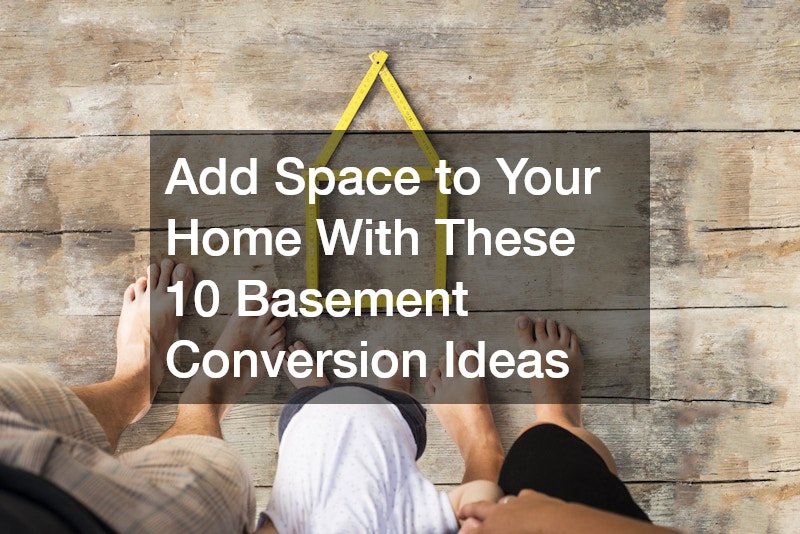Add Space to Your Home With These 10 Basement Conversion Ideas

Are you looking to maximize the space in your home? Consider these basement conversion ideas for turning your basement into a functional and stylish living area. Basements are often one of the most overlooked areas in a house, typically used for storage or left empty, but with a little creativity and the right design ideas, they can be transformed into a valuable extension of your living space.
Whether you’re looking to add extra square footage for a growing family, create a cozy retreat, or increase your home’s resale value, converting your basement is an excellent option. With the right layout and thoughtful design, your basement can become a multi-purpose space. The basement conversion ideas are endless – your space could be perfect for a home office, family room, guest suite, fitness studio, home theater, spa, game room, art studio, wine cellar, or even a rental unit. There are so many possibilities!

1. What Are Some Innovative Ideas for a Basement Home Office?
Creating a home office is just one of many basement conversion ideas. When creating a home office in your basement, it’s important to assess the lighting needs of the space. Natural light is ideal, so consider adding windows or using bright artificial lighting to create a productive environment. Additionally, choose office furniture that is functional and ergonomic to support long hours of work.
Soundproofing is crucial in a basement home office to minimize distractions from the rest of the house. Consider adding insulation to the walls and ceiling to reduce noise transmission. Storage solutions are also essential to keep your workspace organized and clutter-free.
Integrating technology into your basement home office is key for efficiency. Make sure you have easy access to power outlets and internet connections for your devices. Consider adding smart home features like automated lighting and temperature control for a modern touch.
2. How Can You Transform Your Basement Into a Cozy Family Room?
When considering basement conversion ideas, add a family room to the list. Converting your basement into a cozy family room starts with selecting comfortable seating for lounging and entertaining. Choose sofas, chairs, and ottomans that are plush and inviting. Designing a media center with a flat-screen TV and sound system will make your family room the perfect spot for movie nights.You may even be able to add a gas fireplace for extra warmth and comfort.
Creating a play area for kids in your basement family room is a great way to keep them entertained. Consider adding a play kitchen, storage bins for toys, and a small table for arts and crafts. Soft lighting, such as floor lamps and dimmer switches, can help create a relaxing atmosphere.
Choosing durable flooring for your basement family room is essential for withstanding heavy foot traffic. Consider options like vinyl, laminate, or carpet tiles that are easy to clean and maintain. Adding area rugs can provide warmth and define different zones in the room.

3. What Are the Best Ideas for a Basement Guest Suite?
Designing a private bathroom in your basement guest suite will provide added convenience and comfort for your visitors. Consider installing a shower, sink, and toilet to create a standalone bathroom. A local plumbing service can provide an estimate for how much this will cost. Choosing high-quality fixtures and finishes will elevate the look of the space.
When selecting bedroom furnishings for your basement guest suite, opt for a comfortable bed with quality linens and pillows. Adding nightstands, dressers, and a mirror will provide convenience and storage for your guests. Optimizing closet space with shelves and hangers will help them feel at home.
Adding mini kitchen amenities, such as a coffee maker, microwave, and mini-fridge, can make your basement guest suite feel like a home away from home. Providing basic kitchen essentials like dishes, utensils, and glassware will allow your guests to prepare simple meals and snacks. Ensuring guest privacy with curtains or blinds on windows and doors will give them the option to relax in peace.
4. How to Create a Fitness Studio in Your Basement?
Creating a fitness studio is certainly one of the most useful basement conversion ideas. Setting up a fitness studio in your basement requires careful selection of exercise equipment based on your workout preferences and space limitations. Consider versatile pieces like dumbbells, resistance bands, and a workout bench for a full-body workout. Installing mirrored walls can help you check your form and technique while working out.
Choosing appropriate flooring for your basement fitness studio is essential for safety and comfort during workouts. Reach out to a concrete contracting service or consider hardwood floor installers for an upgraded flooring option. Additions like rubber mats, interlocking tiles, or cork flooring provide cushioning for high-impact exercises. Ventilation and air quality are crucial in a basement fitness studio to prevent humidity buildup and ensure a fresh workout environment.
Implementing audio-visual systems, such as speakers and a TV or projector, can enhance your workout experience with energizing music and exercise videos. Consider installing a wall-mounted TV or portable projector for entertainment while exercising. Creating a workout playlist or utilizing fitness apps can help you stay motivated and focused on your fitness goals.

5. Can You Turn Your Basement into a Home Theater?
One of the most family-friendly basement conversion ideas is creating a home theater. Turning your basement into a home theater begins with choosing the right screen and projector for an immersive viewing experience. Consider the size of your basement and seating arrangement when selecting a screen size and resolution. Arranging theater seating in rows or with recliners can elevate the cinematic feel of the room.
Soundproofing the room is essential for a home theater to minimize sound leakage and create a theater-like ambiance. Adding sound-absorbing panels, carpeting, and heavy curtains can help reduce echoes and outside noise. Setting up surround sound speakers strategically around the room can enhance the audio quality of the movie or TV show.
Managing acoustics in your basement home theater can improve sound quality and clarity for an enjoyable viewing experience. Consider adding acoustic panels on walls or ceilings to absorb sound reflections and reduce reverberation. Talk with basement and addition remodelers to get a broader understanding of what is possible. Using rugs, drapes, and soft furnishings can also help dampen sound and create a cozy atmosphere.
6. What Are the Steps to Create a Luxurious Basement Spa?
Designing a relaxation area in your basement spa is essential for creating a tranquil and rejuvenating space. Consider adding comfortable seating like lounge chairs or daybeds for relaxation before or after spa treatments. Incorporating plants, candles, and soothing artwork can enhance the ambiance of the spa.
Setting up a steam room or sauna in your basement spa can provide therapeutic benefits for relaxation and detoxification. Consider installing a prefabricated steam room or sauna kit for easy assembly and maintenance. Adding essential oils or eucalyptus for aromatherapy can enhance the spa experience and promote relaxation.
Installing spa bathtubs with jets or whirlpool features can elevate the luxury of your basement spa and provide a spa-like bathing experience. Consider freestanding or built-in tubs with ergonomic designs for comfort and style. Choosing tranquil decor elements like natural stones, bamboo accessories, and soft lighting can create a serene and inviting atmosphere.

7. How to Design a Basement Game Room?
Designing a game room is another one of the many basement conversion ideas you can consider. Selecting games and entertainment for your basement game room will depend on your interests and space availability. Consider adding a pool table, foosball table, or ping-pong table for competitive play. Designing a bar area with a countertop, stools, and shelving can provide a gathering spot for drinks and snacks.
Incorporating lounge seating like bean bags, floor cushions, or recliners can create a comfortable and casual atmosphere in your basement game room. Arranging seating in clusters or near gaming stations can enhance social interactions and gameplay. Setting up gaming equipment like consoles, controllers, and VR systems will provide entertainment for players of all ages.
Enhancing room aesthetics with colorful decor, wall decals, and themed accessories can personalize your basement game room and make it visually appealing. Consider adding neon signs, posters, and framed artwork to showcase your favorite games or movies. Installing proper lighting fixtures, such as track lights or floor lamps, can brighten the room and create an inviting gaming environment.
8. What Are Creative Ideas for a Basement Art Studio?
Organizing supplies and tools in your basement art studio is key to creating a functional and inspiring workspace. Consider storage solutions like shelves, drawers, and pegboards to keep materials organized and easily accessible. Maximizing natural and artificial light with windows, skylights, or adjustable lamps can provide optimal lighting for art projects.
Designing work and display spaces in your basement art studio can help you stay organized and showcase your creations. Consider setting up a drafting table, easel, or workbench for different art mediums. Creating a gallery wall or hanging shelves can display your artwork and inspiration for a creative environment.
Implementing inspirational decor elements like motivational quotes, artwork, or plants can stimulate creativity and inspire your artistic process. Consider adding a cozy reading nook, music player, or essential oils diffuser for a relaxing and inspiring atmosphere. Ensuring ventilation and air quality with fans or air purifiers can create a healthy and comfortable working environment.
9. How Can You Turn Your Basement Into a Wine Cellar?
If a wine cellar is on your list of basement conversion ideas, controlling temperature and humidity levels in your basement wine cellar will be essential for preserving the quality of your wine collection. Consider installing a wine cooling system or cellar conditioner to maintain ideal storage conditions. Monitoring and adjusting temperature and humidity levels regularly will ensure that your wines age properly.
Choosing wine racks and storage options that accommodate your bottle collection and space constraints is important for an organized wine cellar. Consider wooden racks, metal shelves, or modular storage systems for customization and flexibility. Designing a tasting area with a wine bar, countertop, and glassware can provide a dedicated space for sampling and enjoying your wines.
Installing ambient lighting in your basement wine cellar can enhance the aesthetic appeal and showcase your wine collection. Consider using dimmable LED lights, sconces, or track lighting for a warm and inviting atmosphere. Implementing security measures like locks, alarms, and surveillance cameras can protect your valuable wine collection from theft or damage.
10. What are the Considerations for a Basement Rental Unit?
Meeting legal requirements and obtaining permits for converting your basement into a rental unit is essential to ensure compliance with local regulations. Consult with a local contractor who provides home remodeling or a building inspector to understand zoning laws, safety codes, and rental licensing requirements. Designing multi-purpose spaces in your basement rental unit can maximize its functionality and appeal to potential tenants.
Calculating renovation costs for your basement rental unit will help you budget and prioritize improvements. Consider the cost of materials, labor, permits, and any unforeseen expenses when planning a renovation. Adding essential amenities like a separate entrance, kitchenette, and laundry facilities can increase the rental value and attract tenants looking for convenience.
Ensuring tenant privacy and access in your basement rental unit is crucial for a positive rental experience. Consider installing soundproofing materials, locks on doors and windows, and separate utilities for privacy. Providing clear communication, maintenance services, and emergency contacts can help tenants feel secure and comfortable in their rental space.
Converting your basement into a functional and stylish living area offers endless possibilities for adding space and value to your home. Whether you choose to create a home office, family room, guest suite, fitness studio, home theater, spa, game room, art studio, wine cellar, or rental unit, these basement conversion ideas can help you make the most of your basement space. A well-executed basement renovation can provide the extra square footage you need without the cost or hassle of expanding your home’s footprint. It also increases your home’s resale value, making it a smart investment for the future.
By following these creative basement conversion ideas and working with local contractors and services such as staircase remodels, boiler furnace services, concrete contracting, and small plumbing repairs, you can transform your basement into a versatile and inviting living space that meets your needs and lifestyle. A skilled contractor can help address common basement challenges such as moisture control, insulation, and structural issues, ensuring that the space is safe, comfortable, and long-lasting.
Additionally, when considering basement conversion ideas, take into account both form and function. The layout, lighting, and finishes should be cohesive with the rest of your home while also making the basement feel distinct and purposeful. Whether you’re looking to create a retreat for yourself or a gathering spot for friends and family, with the right planning, your basement can become a dynamic, multi-functional area that adds significant value and enjoyment to your home for years to come.






